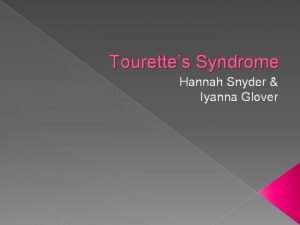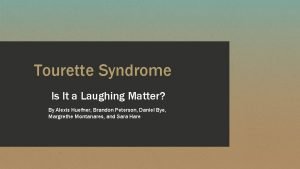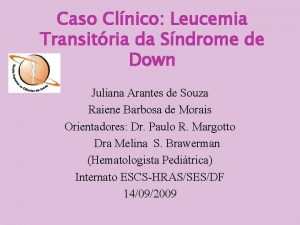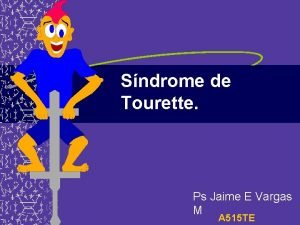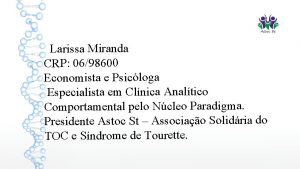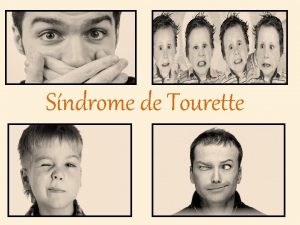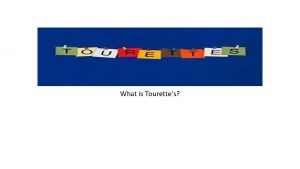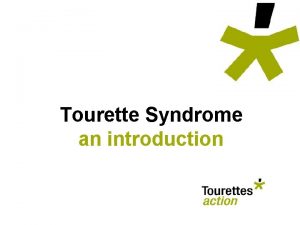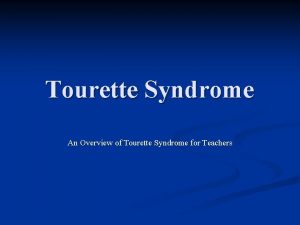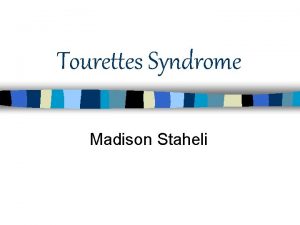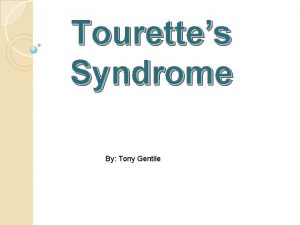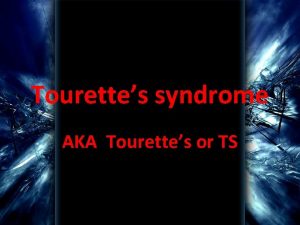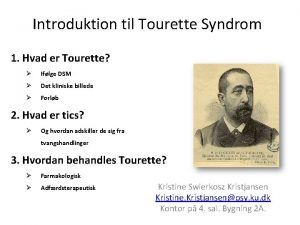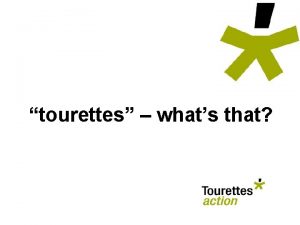Tourettes Syndrome What is Tourettes Tourette Syndrome TS










- Slides: 10

Tourette’s Syndrome

What is Tourettes? • Tourette Syndrome (TS) is a neurological disorder characterized by tics • Tics are involuntary, rapid, sudden movements or vocalizations that occur repeatedly

Tics • Tics might be described as “compelling” rather than involuntary. • People with TS feel an irresistible urge to perform their tics • Some can hold back their tics for hours at a time • This leads to a stronger outburst of tics once they are finally allowed to be expressed.

Diagnostic Criteria • Both multiple motor and one or more vocal tics present at same time, although not necessarily simultaneously • Tics occur many times a day nearly everyday throughout the span of more than one year • Onset usually occurs between 5 – 18 years

2 Types of Tics • Motor Tics – eye blinking, head jerking, shoulder shrugging and facial grimacing. • Vocal Tics – Clearing your throat, sniffing, tongue clicking, words or phrases.

Examples of Tics MOTOR TICS: • Many different kinds of simple motor tics. • Ex: Ankle flexing, head jerking, nose twitching, eye blinking, leg jerking • Making obscene gestures • Mimicking movements that others make VOCAL TICS: • Vocalizing obscene or other socially unacceptable words or phrases (coprolalia) – very rare – These come from the uncontrollable urge to voice the forbidden even when they are the direct opposite of their actual beliefs. • Repeating what someone else just said • Repeating your own words over and over again

Co-Occurring Disorders • People with TS are more likely to have any combination of the following problems: • Attention-Deficit/Hyperactivity Disorder (ADHD) • Obsessive-Compulsive Disorder (OCD) • Learning Disabilities • Sleep disorders

Causes of TS • Research is ongoing, but it is believed that an abnormal metabolism of the neurotransmitters dopamine and serotonin are involved with the disorder. • Genetically transmitted by a dominant gene • Parents having a 50% chance of passing the gene on to their children • Girls with the gene have a 70% chance of displaying symptoms, boys with the gene have a 99% chance of displaying symptoms • Some research suggests that there might be a connection between strep throat infections and TS, but this is still being studied.

Treatments • There is NO cure for TS, and no specific TS medication — although some medications can help control tics if they are severe enough to interfere with a person's life. • Not a psychological condition, but doctors sometimes refer teens with TS to a psychologist or psychiatrist. • A therapist can help people with TS cope with stress better and learn relaxation techniques.

Living with Tourette Syndrome • Many people get better as they mature. • In a small minority the symptoms completely disappear. • IQ of people with TS is normal but tics often interfere with academic success. • Many learn to deal with TS and go on to live productive lives (see the Canadian doctor in Oliver Sacks’ book Anthropologist on Mars)
